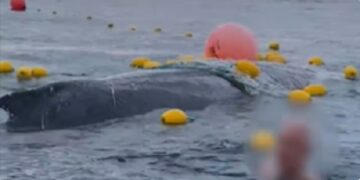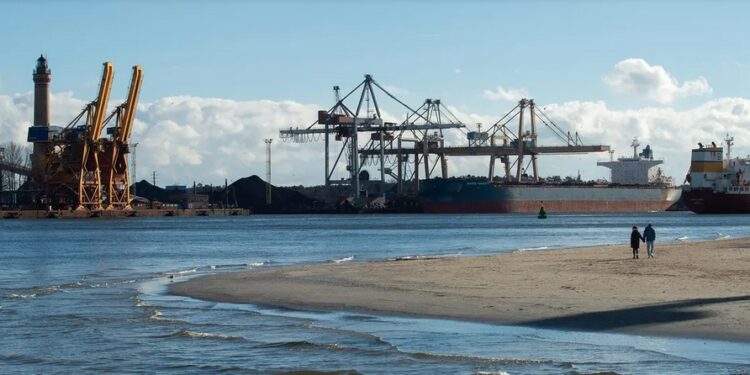Construction of Deep Sea Port in Świnoujście Approved to Continue
The deep sea port in Świnoujście is one of Poland’s largest economic projects, poised to transform the region’s maritime trade landscape. Nonetheless, concerns over environmental damages had previously halted construction following legal complaints from both German and Polish organizations. However, a recent court ruling has given the green light for the project to proceed.
On Monday, Administrative Court Judge Anita Wielopolska announced the decision in Warsaw that construction of the deep sea container port in the Polish city of Świnoujście can move forward. The complaint lodged by the German citizens’ initiative “Lebensraum Vorpommern” and the Polish organization “Grüne Inseln” has been dismissed by the court.
“After reviewing the extensive evidence, the court concluded that the General Director for Environmental Protection did not violate any applicable regulations,” stated Judge Wielopolska. The ruling emphasized that proper consultations were conducted with relevant authorities, necessary opinions were obtained, and all allegations made in the complaints were thoroughly examined.
A Major Economic Development
This ruling signifies that the objections raised by the two organizations concerning the environmental assessment for the port construction have been rejected. According to reports from the Polish news agency PAP, cross-border consultations were also held with German authorities during the planning process.
With estimated construction costs amounting to 584 million euros—approximately 2.3 billion euros when including associated maritime infrastructure—the deep sea port is among the largest economic undertakings in Poland. It is designed to redirect portions of the deep-sea freight traffic towards Poland, featuring a 65-kilometer long access channel capable of accommodating deep-draft vessels.
Environmental Concerns Raised
The plaintiffs raised significant concerns regarding potential environmental damage to the seabed and the nearby islands of Wolin and Usedom. Their legal action led to a construction halt in July, which has now been lifted, much to the relief of Arkadiusz Marchewka, the Deputy Minister of Infrastructure.
“The construction of the terminal is a priority for our government. As I have stated multiple times, no one will stop this investment project,” declared Marchewka. He highlighted on the social platform X that the new capabilities of the port would significantly enhance competitiveness in the Baltic Sea region.
Further addressing the plaintiffs’ concerns, Minister Marchewka acknowledged the potential presence of unexploded World War II ordnance in the harbor’s vicinity. “Should there indeed be unexploded munitions in the harbor area, the Polish Navy will handle the situation,” he assured.
Strategic Importance of the Port
By 2029, cargo ships are expected to dock at the new port, with the project anticipated to provide numerous economic benefits. The development is strategically important, not only for Poland but also for the broader Baltic Sea trade network. With the deep sea port, Poland aims to increase its shipping capacity and attractiveness as a maritime trade hub.
The ambitious project has been received with enthusiasm among proponents who argue that the deep sea port will create jobs, stimulate local economies, and foster trade opportunities. However, environmental activists remain vigilant, emphasizing the importance of sustainable development practices to preserve marine ecosystems.
Balancing Economic Growth and Environmental Protection
The ongoing debate highlights a critical tension between economic development and environmental protection, a challenge faced by many nations undertaking large infrastructure projects. As countries strive for progress, the necessity to weigh economic benefits against environmental implications becomes increasingly significant.
The court’s ruling allows for the continuation of the deep sea port project, but it also calls for ongoing scrutiny regarding its environmental impact. Many are looking towards the Polish authorities to ensure that due diligence is observed in following environmental regulations and addressing relevant concerns.
Future Considerations
Moving forward, it will be vital for all stakeholders, including government officials, environmental organizations, and local communities, to engage in constructive dialogue. Finding common ground can lead to solutions that encompass both economic advancements and environmental safeguards.
As construction resumes, the Polish government will need to demonstrate its commitment to environmental responsibility while pursuing ambitious economic goals with the Świnoujście deep sea port. The watchful eyes of both supporters and opponents will undoubtedly monitor the project’s progress as it develops into a pivotal element of Poland’s economic future.
In conclusion, while the ruling signifies a significant victory for the construction of the deep sea port in Świnoujście, it also underscores the ongoing discourse about environmental safeguards in large development projects. The coming years will reveal how these elements are balanced, potentially setting a standard for future infrastructure undertakings in Poland and beyond.













